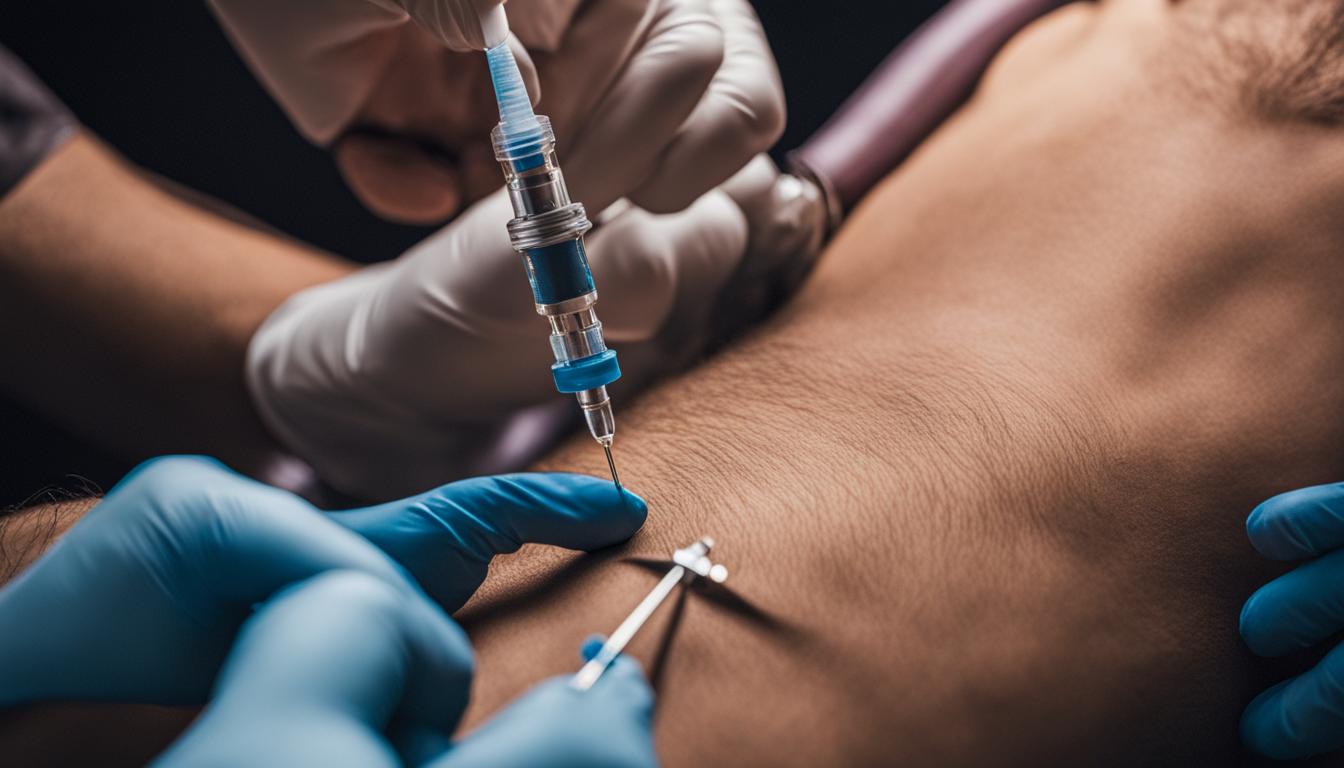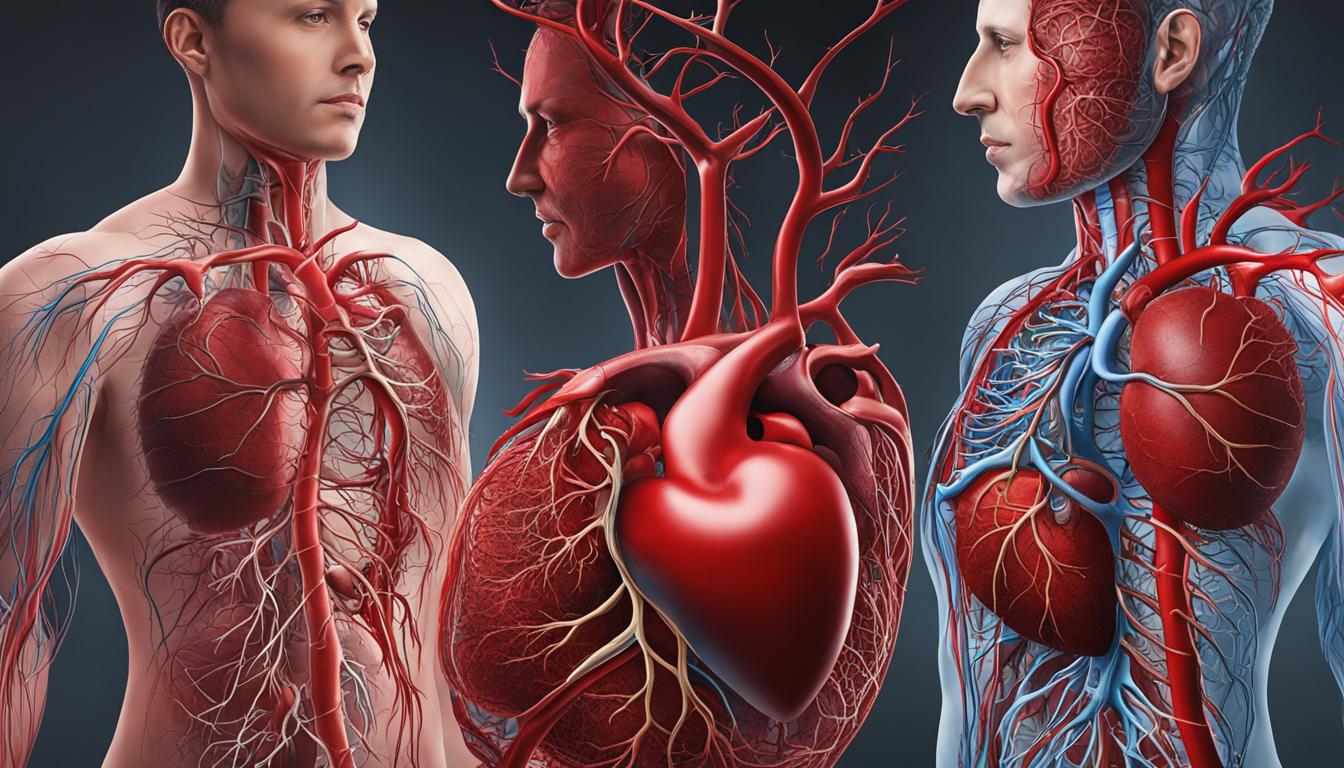Testosterone therapy is a popular treatment for men experiencing age-related decline in testosterone levels. It offers potential benefits in alleviating symptoms such as reduced sexual function and decreased bone density. However, it is essential to understand the potential risks associated with this therapy to make informed decisions about its use.
Key Takeaways:
- Testosterone therapy can help improve symptoms of low testosterone in men.
- Potential benefits include improved sexual function and increased bone density.
- There are risks associated with testosterone therapy, such as worsening sleep apnea and stimulating prostate growth.
- Regular monitoring of testosterone levels and dosage adjustments are crucial for the safe use of this therapy.
- Alternative natural methods may help boost testosterone levels in men without medical conditions contributing to low levels.
What is Testosterone and How Does it Change with Age?
Testosterone is a hormone that is primarily produced in the testicles and is crucial for men’s health. It plays a vital role in various bodily functions, including the development of male reproductive tissues, muscle mass, bone density, and the production of red blood cells. Testosterone also influences sex drive, fertility, and overall mood in men.
However, testosterone levels naturally decline with age. Research suggests that testosterone production begins to decrease gradually after the age of 30, with a more significant decline occurring in later years. This age-related decline in testosterone levels is known as andropause.
As testosterone levels decrease, safty of men’s testosterone replacement therapy men may experience various symptoms and health issues. These can include reduced sexual desire and function, decreased muscle mass and strength, fatigue, increased body fat, mood changes, and decreased bone density. While these changes are a normal part of aging, they can significantly impact a man’s quality of life.
Men’s Testosterone Replacement Therapy
| Age | Average Testosterone Level (ng/dL) |
|---|---|
| 30-40 | 264-916 |
| 40-50 | 201-993 |
| 50-60 | 170-918 |
| 60-70 | 156-700 |
| 70-80 | 156-617 |
It’s important to note that testosterone decline is a normal part of aging, but not all men will experience significant symptoms or require treatment. Consulting with a healthcare professional is essential to determine if testosterone replacement therapy is necessary. testosterone replacement therapy in tampa fl
Benefits and Risks of Testosterone Therapy
Testosterone therapy offers several potential benefits for men with low testosterone levels. It can help improve sexual function and libido, increase muscle mass and strength, and enhance overall mood and energy levels. In addition, testosterone therapy may also improve bone density and reduce the risk of osteoporosis in older men.
However, it is important to be aware of the potential risks associated with testosterone therapy. One of the main concerns is the stimulation of prostate growth, which can increase the risk of developing benign prostatic hyperplasia (BPH) or prostate cancer. Regular monitoring of prostate-specific antigen (PSA) levels is important to detect any abnormalities and ensure early intervention if necessary.
Another potential risk of testosterone therapy is the exacerbation of sleep apnea, a sleep disorder characterized by pauses in breathing during sleep. Testosterone can worsen the symptoms of sleep apnea or even contribute to the development of the condition in some cases. It is crucial for individuals undergoing testosterone therapy to be screened for sleep apnea and closely monitored for any changes in sleep patterns or symptoms.
Although testosterone therapy is generally safe, it is essential to discuss the potential benefits and risks with a healthcare professional before initiating treatment. The decision to undergo testosterone therapy should be based on an individual’s specific medical history, risk factors, and preferences. Regular monitoring of testosterone levels and overall health is critical to ensure the therapy’s effectiveness and safety.
| Benefits of Testosterone Therapy | Risks of Testosterone Therapy |
|---|---|
|
|
Effectiveness of Testosterone Therapy in Older Men
Testosterone therapy is commonly used to treat hypogonadism in older men, a condition characterized by low testosterone levels. However, the effectiveness of testosterone therapy in otherwise healthy older men is still uncertain. While the treatment has shown promising results in individuals with hypogonadism, its benefits and risks in the broader population of aging men are still being studied.
A study published in the Journal of the American Medical Association (JAMA) found that testosterone therapy in older men with low testosterone levels did improve certain symptoms, such as sexual function and physical performance. However, the study also highlighted the need for further research to fully understand the long-term effects and potential risks of testosterone therapy in this population.
It is important to note that testosterone therapy should be approached cautiously, as it is not without risks. Potential side effects include fluid retention, acne, and an increased risk of cardiovascular events. Furthermore, the optimal dosage and duration of treatment for older men without hypogonadism have not been well-established.
Risk-Benefit Analysis of Testosterone Therapy in Older Men
“The use of testosterone therapy in older men without hypogonadism remains controversial. While it may provide some improvements in certain symptoms, such as sexual function and physical performance, the long-term risks and benefits are not fully understood. Additional research is needed to determine the appropriateness of testosterone therapy in this population.”
In conclusion, while testosterone therapy has demonstrated effectiveness in improving symptoms of hypogonadism in older men, its benefits and risks in otherwise healthy aging men are still unclear. Further research is needed to establish the safety and optimal use of testosterone therapy in this population. It is essential for healthcare professionals to carefully consider the individual patient’s medical history and assess the potential risks before recommending testosterone therapy.
Monitoring Testosterone Replacement Therapy
Proper monitoring of testosterone therapy is crucial to ensure its effectiveness and safety. Regular measurement of testosterone levels is essential to determine if the therapy is achieving the desired results. It allows healthcare professionals to make any necessary adjustments to the dosage or treatment plan. Monitoring also helps identify any potential side effects or complications that may arise during the course of the therapy.
The recommended dosage for testosterone replacement therapy varies depending on the individual and their specific needs. It is important to follow the guidance of a healthcare professional who specializes in hormone therapy. They will consider factors such as age, overall health, and the severity of testosterone deficiency when determining the appropriate dosage.
Monitoring testosterone replacement therapy goes beyond just checking testosterone levels. It also involves assessing other health parameters such as blood pressure, cholesterol levels, and prostate health. Regular follow-up appointments allow healthcare professionals to evaluate the overall impact of the therapy and address any concerns or questions that may arise.
Best Practices for Testosterone Replacement Therapy
When undergoing testosterone replacement therapy, it is important to follow certain best practices to ensure optimal results and minimize potential risks. Here are some key best practices to keep in mind:
- Choose a qualified healthcare professional experienced in hormone therapy to oversee your treatment.
- Follow the recommended dosage and treatment plan prescribed by your healthcare professional.
- Attend regular follow-up appointments to monitor your progress and address any concerns.
- Report any changes in symptoms or any potential side effects to your healthcare professional.
- Take steps to maintain a healthy lifestyle, including regular exercise, a balanced diet, and adequate sleep.
- Inform any other healthcare professionals you consult with about your testosterone therapy to ensure coordinated care.
Table: Recommended Dosage for Testosterone Replacement Therapy
| Age Group | Recommended Dosage |
|---|---|
| Younger than 50 | Varies based on individual needs and testosterone levels |
| 50-59 | Varies based on individual needs and testosterone levels |
| 60 and older | Varies based on individual needs and testosterone levels |
Note: The recommended dosage for testosterone replacement therapy should always be determined by a qualified healthcare professional based on individual assessment and monitoring.
Long-Term Safety and Side Effects of Testosterone Therapy
While testosterone therapy can provide benefits in alleviating symptoms of low testosterone, it is important to be aware of the potential long-term effects and side effects of this treatment. Long-term use of testosterone therapy may have both positive and negative effects on men’s health. It is crucial to thoroughly understand these aspects before considering or continuing with testosterone replacement therapy.
One potential side effect of long-term testosterone therapy is acne. Some individuals may experience an increase in acne breakouts, which can be bothersome and affect their self-esteem. It is recommended to discuss this potential side effect with a healthcare provider and explore possible treatment options to manage acne.
Additionally, long-term testosterone therapy may lead to the enlargement of breasts, a condition known as gynecomastia. This side effect can be distressing for some men and may require further evaluation and management by a healthcare professional.
Another important consideration is the increased risk of blood clots associated with long-term testosterone therapy. It is crucial to monitor any signs or symptoms of blood clots, such as swelling, pain, or redness in the legs, and seek immediate medical attention if these symptoms occur.
| Side Effects of Long-Term Testosterone Therapy | Prevalence |
|---|---|
| Acne | Common |
| Gynecomastia (enlarged breasts) | Possible |
| Increased risk of blood clots | Possible |
“Long-term testosterone therapy may have both positive and negative effects on men’s health. It is crucial to thoroughly understand these aspects before considering or continuing with testosterone replacement therapy.”
In conclusion, while testosterone therapy can provide benefits in treating low testosterone levels, it is essential to be aware of the potential long-term effects and side effects. Acne, gynecomastia, and an increased risk of blood clots are some of the possible side effects associated with long-term use. If you are considering testosterone therapy, it is important to discuss the potential risks and benefits with a healthcare provider to make an informed decision. men’s trt clinics tampa fl
Testosterone Therapy and Prostate Health
Testosterone therapy is a widely used treatment for men with low testosterone levels. However, there is some concern about its potential impact on prostate health. While testosterone therapy has been associated with an increased risk of prostate problems, such as benign prostatic hyperplasia (BPH) and prostate cancer, more research is needed to fully understand this relationship.
According to the Mayo Clinic, testosterone therapy should be approached with caution in men with a history of prostate cancer, as it may stimulate prostate growth and potentially worsen the condition. In such cases, the potential benefits and risks of testosterone therapy should be carefully evaluated, and it is advisable to consult with a healthcare professional to determine the best course of action.
It is important to note that testosterone therapy is not recommended for men with current or suspected prostate cancer. Regular monitoring of prostate-specific antigen (PSA) levels is also crucial for men undergoing testosterone therapy, as an increase in PSA levels can indicate the development or progression of prostate cancer.
Precautions for Testosterone Therapy
When considering testosterone therapy, it is important to follow recommended guidelines and precautions to minimize the potential risks. The Mayo Clinic advises the following:
- Testosterone therapy should only be administered under the supervision of a qualified healthcare professional.
- Regular monitoring of testosterone levels, hematocrit levels, and prostate-specific antigen (PSA) levels is essential to ensure the therapy’s safety and effectiveness.
- Prior to starting testosterone therapy, a comprehensive evaluation should be conducted to assess any underlying prostate conditions or other health concerns.
- Individuals with a history of prostate cancer or those at an increased risk should exercise caution and discuss the potential risks and benefits with their healthcare provider.
- Testosterone therapy should not be initiated for purely cosmetic reasons or to improve athletic performance.
By following these precautions and closely monitoring the therapy, individuals can make informed decisions about testosterone replacement therapy in consideration of their overall prostate health.
Testosterone Therapy and Cardiovascular Health
Testosterone therapy has gained popularity
as a treatment for low testosterone levels in men. While it can provide various benefits, concerns have been raised regarding its impact on cardiovascular health. Some studies suggest a potential link between testosterone therapy and an increased risk of cardiovascular problems, including heart disease. However, it is important to note that more research is needed to fully understand the long-term safety of testosterone replacement therapy.
Managing the potential side effects of testosterone therapy is crucial to ensure the overall safety of the treatment. Common side effects may include acne, enlarged breasts, and an increased risk of blood clots. It is important for individuals undergoing testosterone therapy to discuss these potential risks with their healthcare providers and to closely monitor their health throughout the treatment period.
While there may be concerns about the cardiovascular effects of testosterone therapy, it is worth noting that low testosterone levels themselves have been associated with an increased risk of cardiovascular problems. Testosterone plays a role in maintaining cardiovascular health, and low levels of this hormone can contribute to the development of heart disease and other cardiovascular conditions. Thus, the decision to undergo testosterone therapy should be made on an individual basis, considering the potential risks and benefits in the context of each person’s overall health and medical history.
Risks and Benefits of Testosterone Therapy: A Balanced Approach
Table: Summary of Risks and Benefits of Testosterone Therapy – risks of testosterone replacement therapy
| Benefits | Risks |
|---|---|
| Improved sexual function | Worsening sleep apnea |
| Increased muscle mass and strength | Stimulation of prostate growth |
| Increased bone density | Acne |
| Improved mood and cognitive function | Enlarged breasts |
| Enhanced quality of life | Increased risk of blood clots |
It is essential for individuals considering testosterone therapy to engage in open and honest discussions with their healthcare providers. By weighing the potential benefits against the risks and considering each person’s unique circumstances, a balanced decision can be made. Regular monitoring of cardiovascular health and other potential side effects is crucial to ensure the safety and effectiveness of testosterone replacement therapy. Further research is needed to provide more comprehensive insights into the long-term safety and impact of testosterone therapy on cardiovascular health. best practices for testosterone replacement therapy , hormone replacement therapy, testosterone replacement therapy safety.
Natural Alternatives to Testosterone Therapy
For men who do not have a medical condition contributing to low testosterone levels, there are natural alternatives to consider before opting for testosterone therapy. These alternatives focus on lifestyle changes, exercise, and weight loss, which can help boost testosterone levels and improve overall health.
Lifestyle Changes: Making certain lifestyle changes can have a positive impact on testosterone levels. This includes getting adequate sleep, reducing stress, and avoiding excessive alcohol consumption. Additionally, maintaining a healthy diet that includes foods rich in zinc, vitamins D and E, and healthy fats, such as avocados and nuts, can support optimal testosterone production.
Exercise: Regular physical activity, especially strength training and high-intensity interval training (HIIT), has been shown to increase testosterone levels. Incorporating exercises that target large muscle groups, like squats and deadlifts, can be particularly beneficial. However, it is important to consult with a healthcare professional or fitness expert before starting any new exercise regimen.
Losing excess body weight can help improve testosterone levels, especially in men who are overweight or obese. Studies have shown that even a modest weight loss of 5-10% can lead to significant increases in testosterone levels. This can be achieved through a combination of regular exercise and a balanced, calorie-controlled diet.
While natural alternatives can be effective for men with mild cases of low testosterone, it is important to consult with a healthcare professional to determine the most suitable approach based on individual circumstances and health conditions.
Considerations for Testosterone Therapy in Men with Prostate Cancer
Men with a history of prostate cancer need to approach testosterone therapy with caution due to potential risks. The therapy may stimulate prostate growth and potentially worsen the condition. While there is ongoing debate and research in this area, it is important to consider the individual’s specific situation and consult with a healthcare professional to determine the best course of action.
Testosterone replacement therapy precautions
The safety of testosterone therapy in men with prostate cancer is a complex and evolving topic. While some studies suggest an increased risk of prostate problems, including benign prostatic hyperplasia and prostate cancer, others argue that testosterone therapy is not associated with an elevated risk in carefully selected patients. The decision to proceed with testosterone therapy in these cases should be made on an individual basis, taking into account the risks and potential benefits. Never forget the safety of men’s testosterone replacement therapy.
It is crucial for men with a history of prostate cancer to undergo thorough evaluations and monitoring before and during testosterone therapy. Regular prostate-specific antigen (PSA) tests and prostate examinations are essential to detect any potential changes or signs of cancer recurrence. These monitoring procedures help to ensure that any potential risks are identified early and appropriate action can be taken.
| Risks | Benefits |
|---|---|
| Increase in prostate-specific antigen (PSA) levels | Improved quality of life and symptom relief |
| Possible stimulation of prostate growth | Increased bone density |
| Potential cancer recurrence or progression | Restored sexual function and libido |
| Worsening of pre-existing prostate cancer | Enhanced mood and energy levels |
Quote:
“While testosterone therapy in men with a history of prostate cancer is a complex issue, it is important for these individuals to have open and honest discussions with their healthcare providers. The decision to pursue testosterone therapy should involve a careful evaluation of each person’s unique circumstances and considerations.” – [Healthcare Professional Name]
Testosterone Therapy in Older Men with Hypogonadism
Testosterone replacement therapy has shown promising results in improving symptoms of hypogonadism in older men. Hypogonadism refers to a condition where the body does not produce enough testosterone, leading to various health issues and decreased quality of life. The use of testosterone therapy can help restore testosterone levels, ultimately alleviating the symptoms associated with hypogonadism.
Research has demonstrated that testosterone replacement therapy can lead to significant improvements in sexual function, including increased libido and improved erectile function. Additionally, it has been shown to enhance muscle strength and reduce fat mass. These benefits can greatly improve the overall well-being and quality of life for older men with hypogonadism.
It is important to note that testosterone replacement therapy should only be considered for men with clinically diagnosed and confirmed hypogonadism. The therapy should be approached with caution and under the guidance of a healthcare professional. Regular monitoring of testosterone levels and potential side effects is necessary to ensure the therapy’s effectiveness and safety.
| Benefits of Testosterone Therapy in Older Men with Hypogonadism | Risks and Considerations |
|---|---|
| Improved sexual function and libido | Polycythemia (increase in red blood cell count) |
| Increased muscle strength and reduced fat mass | Worsening sleep apnea |
| Enhanced mood and overall well-being |
It is crucial for older men with hypogonadism to weigh the potential benefits of testosterone therapy against the associated risks. This includes considering the specific health needs and concerns, as well as understanding the potential side effects. Open communication with healthcare professionals can help individuals make informed decisions about whether testosterone replacement therapy is a suitable treatment option for them.
“Testosterone replacement therapy has emerged as an effective treatment for older men with hypogonadism. It can improve symptoms, enhance quality of life, and restore testosterone levels to a more optimal range.”
Risks and Benefits of Testosterone Therapy in Elderly Men
Testosterone therapy offers potential benefits for elderly men with low testosterone levels, but it is essential to consider the associated risks and take precautions. The benefits of testosterone replacement therapy include improved libido, increased bone density, and enhanced mood and well-being. It can also help alleviate symptoms such as fatigue, decreased muscle mass, and cognitive decline. However, it is crucial to note that individual responses to testosterone therapy may vary. male testosterone replacement therapy (trt)
While testosterone therapy can provide numerous benefits, it is not without risks. Some of the potential risks and precautions associated with testosterone replacement therapy include the following:
- Polycythemia: Testosterone therapy may increase the production of red blood cells, leading to higher hematocrit levels. Regular monitoring of hematocrit levels is necessary to prevent complications.
- Worsening Sleep Apnea: Testosterone therapy can worsen pre-existing sleep apnea or contribute to its development. It is crucial for individuals with sleep apnea or a history of the condition to be closely monitored during testosterone therapy.
- Cardiovascular Issues: There is ongoing debate regarding the potential impact of testosterone therapy on cardiovascular health. Some studies suggest a possible association between testosterone therapy and an increased risk of cardiovascular problems. It is important for healthcare providers to evaluate each individual’s cardiovascular risks before initiating testosterone therapy.
It is essential to consult with a qualified healthcare provider before starting testosterone therapy. They will assess your individual needs, evaluate potential risks, and monitor your progress throughout the treatment. Regular follow-up appointments and blood tests will help ensure the therapy’s safety and effectiveness.
Overall, testosterone therapy can provide significant benefits for elderly men with low testosterone levels. However, it is crucial to fully understand the associated risks and take necessary precautions under the guidance of a healthcare professional.
| Benefits of Testosterone Therapy | Precautions and Risks of Testosterone Therapy |
|---|---|
| Improved libido | Polycythemia |
| Increased bone density | Worsening sleep apnea |
| Enhanced mood and well-being | Cardiovascular issues |
“Testosterone therapy has shown great promise in improving the quality of life for elderly men with low testosterone levels. However, it is crucial for healthcare providers to carefully assess individual risks and monitor potential side effects to ensure the therapy’s safety.”
Age-Related Decline in Testosterone Levels and Health Risks
The natural decline in testosterone levels that occurs with age can have significant impacts on men’s health. Research suggests that low testosterone levels are associated with an increased risk of various health conditions, including metabolic syndrome, diabetes, and even mortality.
Studies have found that men with low testosterone are more likely to develop metabolic syndrome, a cluster of conditions that includes high blood pressure, high blood sugar, excess body fat around the waist, and abnormal cholesterol levels. Metabolic syndrome is a known risk factor for cardiovascular disease and type 2 diabetes. Elevated glucose levels and insulin resistance, both of which are common in men with low testosterone, further contribute to the development of diabetes.
Additionally, low testosterone levels in older men have been linked to an increased risk of mortality. A study published in the Journal of Clinical Endocrinology & Metabolism found that men with low testosterone levels had a higher risk of all-cause and cardiovascular mortality compared to those with normal levels of testosterone. The exact mechanisms behind this association are still being studied, but it is believed that testosterone plays a role in maintaining overall health and vitality in men.
Table: Health Risks Associated with Age-Related Decline in Testosterone Levels
| Health Condition | Risk |
|---|---|
| Metabolic Syndrome | Increased risk |
| Type 2 Diabetes | Increased risk |
| Mortality | Higher risk of all-cause and cardiovascular mortality |
It is important to note that while the decline in testosterone levels is associated with these health risks, it does not necessarily mean that testosterone replacement therapy is the solution for everyone. Decisions regarding hormone therapy should be made on an individual basis, taking into account the potential benefits, risks, and overall health status of the individual.
Next, we will explore the long-term effects of testosterone replacement therapy and the considerations that need to be taken into account when considering hormone therapy for men.
Conclusion
In conclusion, men’s testosterone replacement therapy can provide effective treatment for individuals with low testosterone levels. However, it is crucial to prioritize safety when considering this therapy. Understanding the potential benefits and risks is essential for making informed decisions.
It is important to note that testosterone therapy has shown positive results in alleviating symptoms such as reduced sexual function and decreased bone density. However, it is crucial to closely monitor the therapy and adjust the dosage as necessary to ensure the best outcomes.
While testosterone replacement therapy can be beneficial, it is equally important to be aware of potential side effects, including acne, enlarged breasts, and increased risk of blood clots. Regular monitoring and communication with healthcare professionals are essential for managing these risks and ensuring the safety of the treatment.
Overall, men’s testosterone replacement therapy can be a valuable option for individuals with low testosterone levels, but safety should always be prioritized. By weighing the potential benefits against the risks and maintaining close monitoring, individuals can make informed decisions about their treatment and achieve optimal outcomes.
<iframe src=”https://viddle.in/embed/AoMe8sUV/?title=true&share=true&controls=true&context=true&color=blue” style=”position: absolute; top: 0; left: 0; bottom: 0; right: 0; width:100%; height: 100%; border: none; overflow: hidden;” allowfullscreen></iframe>
Testosterone Therapy Tampa Men Clinic
FAQ
What is testosterone therapy?
Testosterone therapy is a treatment option for men experiencing low testosterone levels, also known as hypogonadism. It involves the administration of testosterone, typically through injections, gels, patches, or pellets, to restore testosterone levels to normal range.
What are the benefits of testosterone therapy?
Testosterone therapy can help alleviate symptoms associated with low testosterone, such as reduced sexual function, decreased bone density, and fatigue. It may also improve muscle mass, mood, and cognitive function.
What are the risks and side effects of testosterone therapy?
Testosterone therapy carries some risks and potential side effects. These may include worsening sleep apnea, stimulating prostate growth, acne, enlarged breasts, increased risk of blood clots, and potential cardiovascular problems. However, the specific risks and side effects can vary depending on individual factors and should be discussed with a healthcare professional.
Is testosterone therapy effective for older men?
Testosterone therapy has been shown to be effective in improving symptoms of hypogonadism, such as sexual function and muscle strength, in older men. However, its effectiveness in otherwise healthy older men is still uncertain.
How is testosterone replacement therapy monitored?
Proper monitoring of testosterone therapy is essential to ensure its effectiveness and safety. This includes regular measurement of testosterone levels and adjusting the dosage as needed. It is recommended to work closely with a healthcare professional to monitor the therapy and address any concerns or side effects.
What are the long-term safety and side effects of testosterone therapy?
Long-term use of testosterone therapy may have both positive and negative effects. Some potential side effects include acne, enlarged breasts, increased risk of blood clots, and potential prostate health issues. Further research is needed to fully understand the long-term safety and side effects of testosterone replacement therapy.
Does testosterone therapy affect prostate health?
There is some concern that testosterone therapy may increase the risk of prostate problems, such as benign prostatic hyperplasia and prostate cancer. However, more research is needed to fully understand this relationship. Men with a history of prostate cancer should approach testosterone therapy with caution, as it may stimulate prostate growth.
Does testosterone therapy affect cardiovascular health?
Some studies suggest that testosterone therapy may increase the risk of cardiovascular problems, including heart disease. However, more research is needed to determine the long-term safety and the potential impact of testosterone replacement therapy on cardiovascular health.
Are there natural alternatives to testosterone therapy?
For men who do not have a medical condition contributing to low testosterone levels, lifestyle changes, such as exercise, weight loss, and a healthy diet, may help naturally boost testosterone levels. It is advisable to consult with a healthcare professional before considering any alternative treatments.
How should testosterone therapy be approached in men with prostate cancer?
Testosterone therapy should be approached with caution in men with a history of prostate cancer, as it may stimulate prostate growth and potentially worsen the condition. It is important to discuss the potential risks and benefits with a healthcare professional before considering testosterone therapy.
Is testosterone therapy recommended for older men with hypogonadism?
Testosterone replacement therapy has been shown to be effective in improving symptoms of hypogonadism in older men, including sexual function and muscle strength. However, it is important to weigh the potential benefits against the risks and discuss individual circumstances with a healthcare professional.
What are the risks and benefits of testosterone therapy in elderly men?
Testosterone therapy offers potential benefits for elderly men with low testosterone levels, such as improved sexual function and increased muscle strength. However, it also carries risks, such as polycythemia and worsening sleep apnea. The decision to undergo testosterone therapy should be made after careful consideration of the potential risks and benefits, in consultation with a healthcare professional.
How does age-related decline in testosterone levels impact health?
Age-related decline in testosterone levels is associated with various health risks, including metabolic syndrome, diabetes, and mortality. Addressing low testosterone levels through therapy may help mitigate these risks, but further research is needed to fully understand the impact on overall health.
What is the conclusion regarding the safety of men’s testosterone replacement therapy?
Testosterone replacement therapy can be an effective treatment for men with low testosterone levels. However, it is important to weigh the potential benefits against the risks and monitor the therapy closely to ensure safety. Regular monitoring, following recommended dosage guidelines, and open communication with a healthcare professional are essential for managing the risks associated with testosterone therapy.
Source Links





